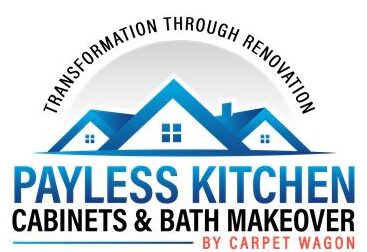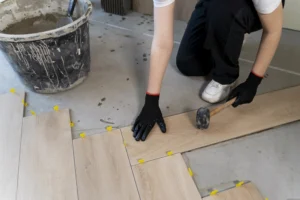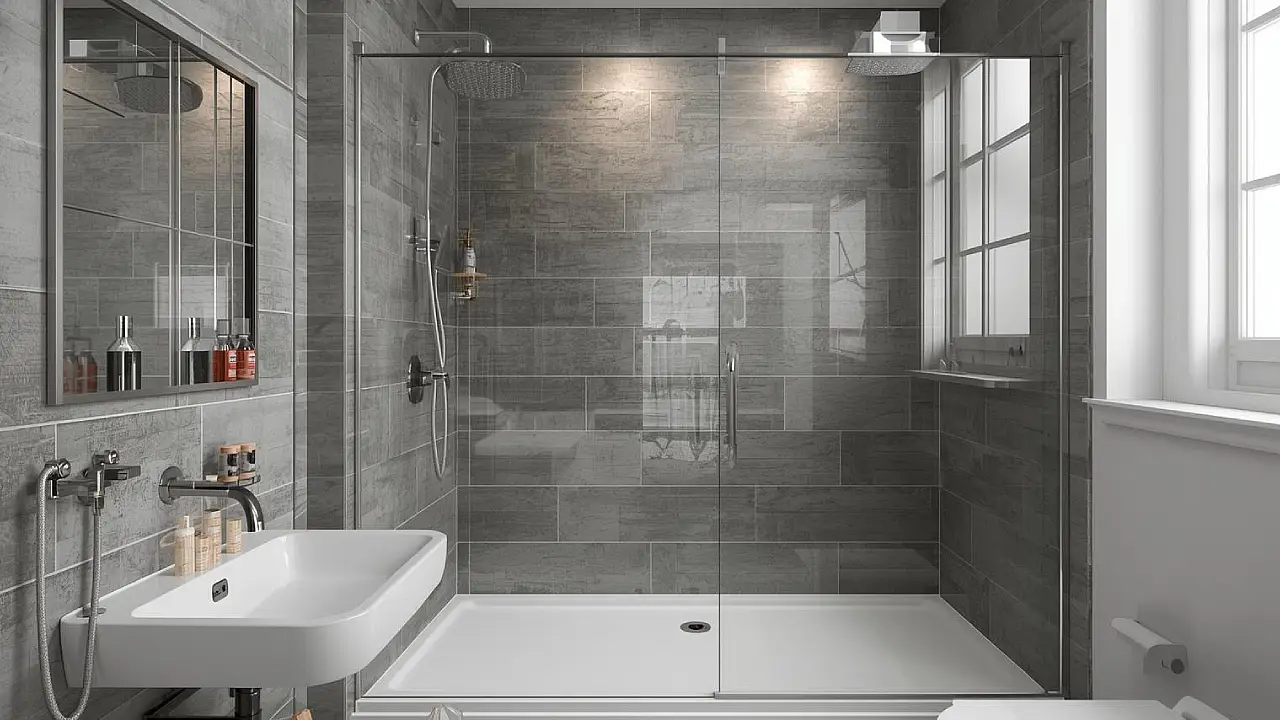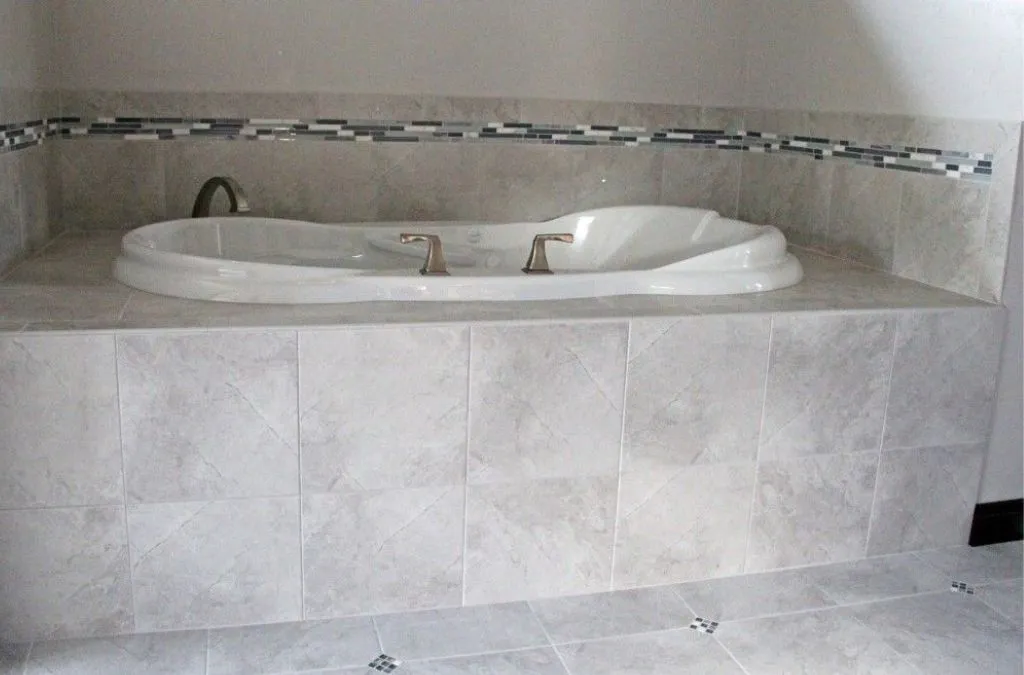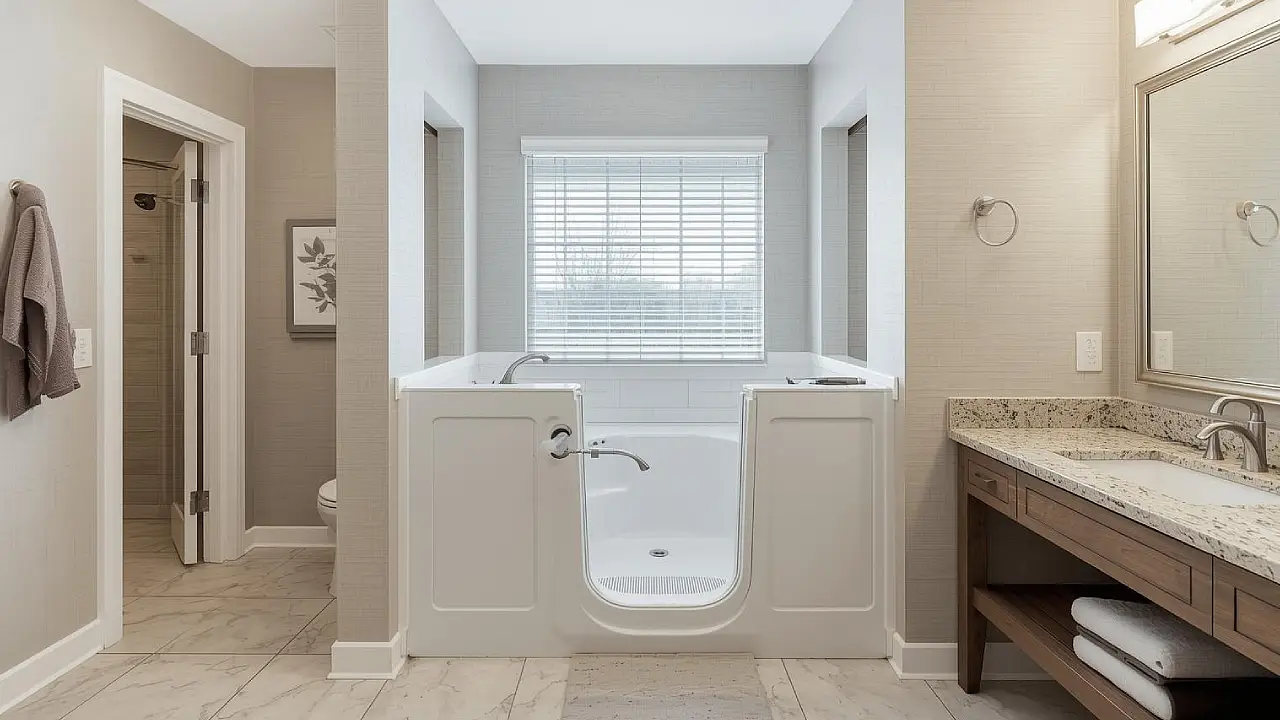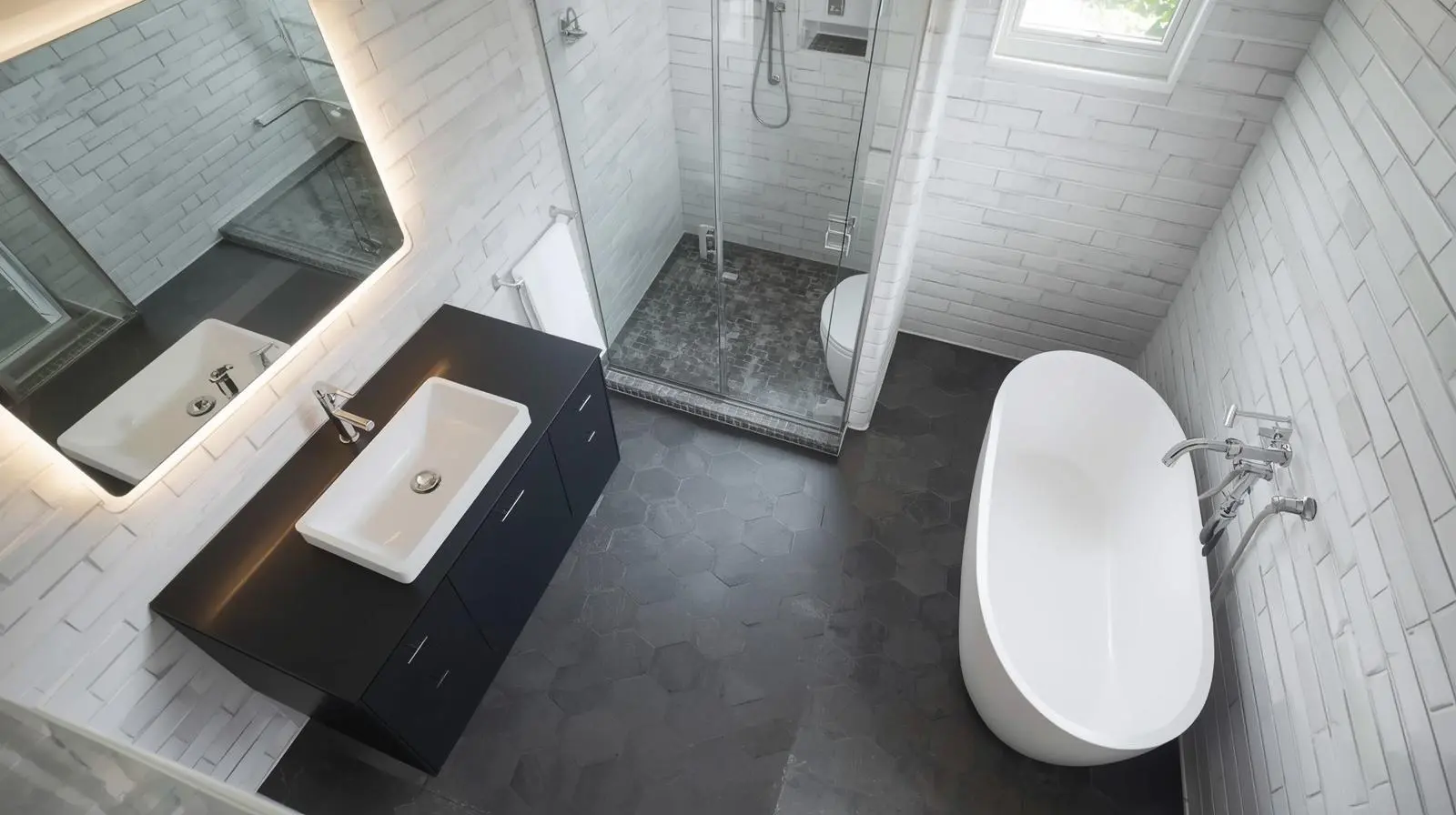As we age, our homes need to adapt with us, especially when it comes to the bathroom. What was once a simple room becomes one of the most important spaces for safety, comfort, and independence. A well-thought-out bathroom remodel for seniors can make daily routines easier and significantly lower the risk of accidents. If you or a loved one is looking to age in place safely, remodeling the bathroom is one of the smartest home upgrades you can consider.
Why Bathroom Safety Matters for Seniors During a Remodel
A bathroom remodel for seniors isn’t just about aesthetics. It’s about reducing the risk of injury, increasing confidence, and making daily living more manageable. Falls are a leading cause of injury among older adults, and slippery, cramped bathrooms often contribute to those accidents. A remodel with senior-friendly features helps avoid these common hazards.
Common Challenges Faced in Traditional Bathrooms
Many traditional bathrooms were not designed with aging in mind. Deep bathtubs, low toilet seats, slick floors, and poor lighting are just a few examples of what makes older bathrooms difficult for seniors to use safely. Arthritis, balance issues, or mobility limitations can turn a standard setup into a stressful environment.
Planning a Senior-Friendly Bathroom Remodel
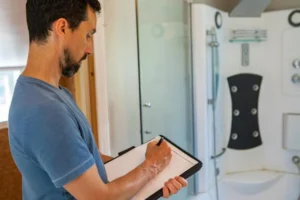
When planning a bathroom remodel for elderly parents or yourself, consider both current needs and possible future challenges. Function, accessibility, and comfort should all come into play when making decisions.
- Assessing Current Bathroom Conditions
Look around and identify what’s already working and what’s becoming a problem. Are grab bars in place? Is the flooring slip-resistant? Can someone easily get in and out of the shower without help? A quick walk-through can highlight major areas for improvement.
- Consulting with Occupational Therapists or Aging-in-Place Specialists
These professionals understand the physical limitations that can come with aging and can offer valuable suggestions. They might recommend installing shower seating, adjusting counter heights, or repositioning fixtures to improve maneuverability.
- Setting a Realistic Budget
Remodeling a bathroom can get expensive quickly. Start with a budget range and stick to it as best you can. Remember that features like walk-in tubs or curbless showers may have a higher upfront cost but provide lasting safety and peace of mind.
Essential Features for Senior-Safe Bathrooms
The right modifications can drastically improve both safety and usability. Whether you’re doing a full renovation or just a few upgrades, here are the top features to consider.
- Walk-In Showers vs. Bathtubs
A walk-in shower is often the safer and more practical choice for seniors. It’s easier to enter and exit, and you can install seating and handheld showerheads to make the experience more comfortable.
- Benefits of Curbless Showers
Curbless or barrier-free showers eliminate the need to step over a ledge, reducing the risk of tripping. They’re ideal for wheelchair users and offer a clean, modern look.
- Considerations for Walk-In Tubs
Walk-in tubs are perfect for seniors who enjoy soaking. They have built-in doors and seats, allowing for safer bathing without the need to climb over high sides.
Non-Slip Flooring Options
Safety flooring is one of the most important choices in a bathroom remodel for aging adults. Vinyl, rubber, and textured tiles offer better grip and reduce fall risk. Look for flooring that is both slip-resistant and water-resistant.
- Comfort-Height Toilets
These toilets sit a bit higher than traditional ones, making it easier to sit down and stand up. It’s a small change that can make a big difference in daily life.
- Grab Bars and Support Rails
Support bars near the toilet, shower, and tub give seniors something to hold onto, providing stability where it’s needed most.
- Placement Guidelines
Install grab bars at standing and seated levels. They should be easy to reach but not in the way. Professional installation is important to make sure they are securely anchored.
Materials and Styles
Grab bars no longer look institutional. You can find options in brushed nickel, chrome, or matte black that match your bathroom’s design while still offering full support.
- Enhancing Accessibility and Ease of Use
Accessibility is all about removing barriers, both physical and functional.
- Doorway Widening and Threshold Ramps
For seniors using walkers or wheelchairs, narrow doorways can be a real obstacle. Widening the entrance or adding low-threshold ramps allows for smoother transitions in and out of the room.
- Lever-Style Faucets and Handles
Levers are easier to operate than round knobs, especially for seniors with arthritis or limited hand strength. They allow for easy water flow control with just a push or pull.
- Anti-Scald Devices and Thermostatic Valves
Burns from hot water can happen in seconds. Installing devices that regulate water temperature can prevent sudden surges and keep bath time safe.
Motion-Activated Lighting
Motion-sensor lighting helps seniors who may need to use the bathroom at night. These lights turn on automatically and reduce the need to fumble with switches in the dark.
- Design Considerations for Comfort and Aesthetics
Comfort doesn’t have to take a backseat to function. You can have both with the right planning.
- Color Contrast for Visual Clarity
Using contrast between the floor, walls, and fixtures helps with depth perception. A white toilet against a darker wall, for instance, is easier to see for someone with reduced vision.
- Natural and Task Lighting
Bright, layered lighting is important. Use a mix of natural light, overhead lighting, and vanity lights to reduce shadows and improve visibility.
Space Optimization in Small Bathrooms
In a small space, consider wall-mounted sinks and vanities to open up floor area. Choose sliding doors or pocket doors instead of swinging ones to save space.
- Storage Solutions Within Easy Reach
Avoid overhead storage or low cabinets that require bending. Place everyday items like toiletries and towels in reachable drawers or open shelves at waist height.
- High-Tech and Innovative Solutions
Modern tech can make senior-friendly bathrooms even more user-friendly.
- Smart Showers and Voice-Control Features
Digital controls make setting water temperature easy and accurate. Some systems even respond to voice commands or remote controls.
- Emergency Alert Systems and Fall Detection
Installing a waterproof emergency button or using wearable alert devices can be life-saving. Some systems also detect falls automatically and call for help.
Heated Flooring and Towel Warmers
Warm feet and cozy towels can add an element of comfort, especially for seniors who are sensitive to cold. Heated flooring also helps dry wet surfaces faster, reducing the risk of slips.
- DIY vs. Hiring a Professional
Deciding whether to remodel on your own or hire help depends on your comfort level and the scope of work.
- Pros and Cons of DIY Bathroom Remodeling
While doing it yourself might save money, it can also be time-consuming and physically demanding. Mistakes in plumbing or electrical work can lead to bigger problems down the road.
- Choosing the Right Contractor
Look for a contractor with experience in senior-friendly renovations. They’ll understand how to install accessible features and how to meet local building codes.
Questions to Ask
Ask about their past projects, timelines, and whether they’re familiar with aging-in-place modifications. A good contractor will listen to your needs and suggest practical solutions.
- Credentials and Certifications to Look For
Search for professionals who hold CAPS (Certified Aging in Place Specialist) credentials. This means they’ve been trained in designing spaces for long-term senior use.
- Cost Breakdown and Financing Options
Cost is always a consideration, but some resources can help.
- Typical Remodel Costs for Senior-Friendly Bathrooms
Expect to spend anywhere from $5,000 for small upgrades to $25,000 or more for a full renovation. Walk-in tubs and curbless showers are among the priciest items, but they offer lasting value.
- Medicare, Medicaid, and Veterans Assistance
These programs may help cover part of the cost if the remodel is deemed medically necessary. Veterans might qualify for grants through the VA for accessibility improvements.
Grants and Nonprofit Programs
Local housing agencies and nonprofits sometimes offer funding to help seniors stay in their homes safely. It’s worth researching what’s available in your area.
- Maintenance and Long-Term Usability
Choosing materials and features that are easy to clean and maintain can make life simpler.
- Easy-to-Clean Surfaces and Fixtures
Go for seamless countertops, wall-mounted toilets, and minimal grout lines. These features cut down on cleaning time and reduce the buildup of dirt and mold.
- Modular Upgrades for Future Needs
Think ahead by installing reinforcements behind walls now, so you can easily add grab bars or benches later. Choosing fixtures that can be swapped out as needs change saves money over time.
Real-Life Examples and Case Studies
Hearing how others made their homes safer can be encouraging and useful.
- Before-and-After Bathroom Remodels
Seeing a cramped, unsafe bathroom turn into a bright and spacious room with a walk-in shower and better lighting can show what’s possible, even on a tight budget.
- Lessons Learned from Senior Homeowners
Many seniors say they wish they had made changes earlier. Planning now can help avoid the need for rushed remodels after an injury or illness.
Let’s make your home safer and more comfortable. Contact us today for a free consultation!
Conclusion
A thoughtful bathroom remodel for seniors goes beyond looks. It supports independence, adds safety, and brings peace of mind. By making smart upgrades like grab bars, non-slip flooring, and accessible showers, you’re not just improving a room, you’re improving quality of life. Whether you’re helping a loved one or thinking ahead for yourself, these changes make everyday routines easier and safer.
- Bathroom Tub Surround Ideas, Designs, Materials and Styles - February 19, 2026
- Walk-In Shower Dimensions, Standard Sizes and Layout Tips - February 18, 2026
- Shower and Tub Combo Ideas: Design Tips and Layouts - February 12, 2026
